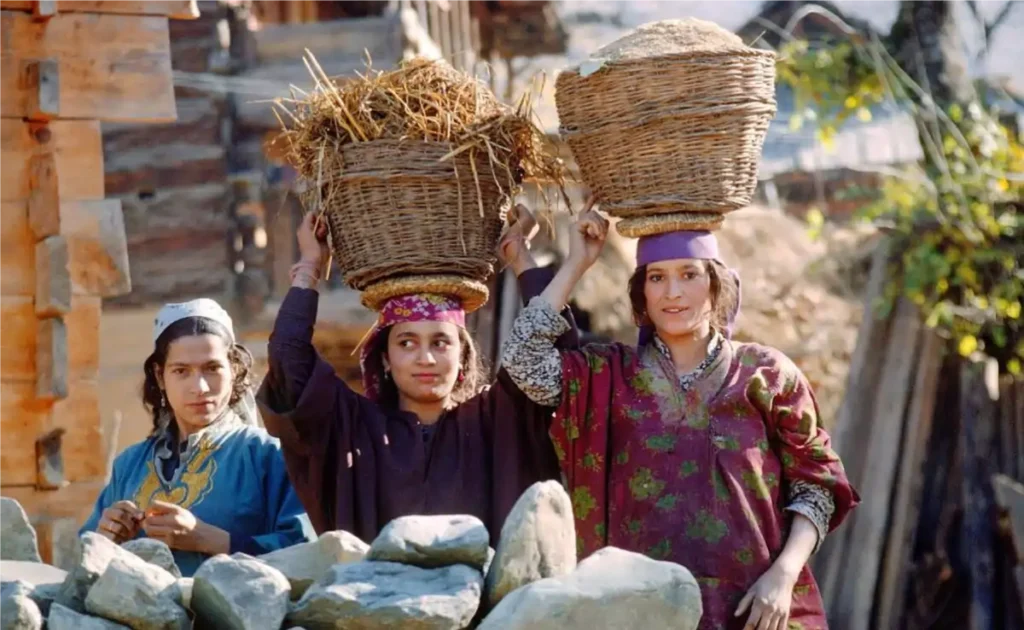Kashmiri Cultural, often called “Paradise on Earth,” is known not only for its breathtaking landscapes but also for its rich and diverse cultural heritage. The culture of Azad Jammu and Kashmir (AJK) stands as a testament to centuries of tradition, resilience, and beauty. The region’s culture is a blend of its indigenous roots, Islamic influences, and exchanges with neighboring civilizations. Over the years, this unique cultural fabric has not only survived adversity but flourished, giving the world a glimpse into the heart of Kashmiri life.
Kashmiri Cultural Values: Family, Hospitality, and Community Spirit
In Azad Kashmir, family and community are the cornerstones of life. Family members cherish their bond, with extended families often living together or nearby, reflecting the region’s deep-rooted values of closeness and solidarity. People highly respect elders, and they pass down their wisdom through generations, preserving not just stories but vital life lessons.
Hospitality is a key cultural trait. Visitors are welcomed with open arms, and the concept of Mehman Nawazi (hospitality) is a cherished tradition in every household. Whether it’s offering a cup of Kashmiri Kahwa (traditional tea) or inviting guests to share a hearty meal of Wazwan (a multi-course feast), the Kashmiri spirit of welcoming others is unrivaled.
Kashmiri Cultural of Music and Arts
Music in Azad Kashmir is not just entertainment—it’s an expression of love, longing, spirituality, and history. Traditional folk songs, often performed during social gatherings, weddings, and festivals, evoke the beauty of nature and the deep emotional connection to the land. Sufi music holds a revered place, with poetry from revered figures like Sheikh Noor-ud-Din Noorani (Sheikh-ul-Alam) inspiring generations.
Kashmiri music is characterized by instruments like the Rabab (a string instrument) and Santoor (a hammered dulcimer). These instruments, along with the haunting tunes, echo through the valleys, telling tales of the land, its people, and their enduring love for their heritage.
To celebrate the cycles of nature, harvests, and community bonding.
- Eid-ul-Fitr and Eid-ul-Adha are the two grandest celebrations in Azad Kashmir. After fasting during Ramadan, people celebrate Eid-ul-Fitr with joy, feasting, and charity, while they mark Eid-ul-Adha with prayers, animal sacrifices, and a deep sense of spiritual devotion.
- People celebrate Baisakhi, a festival marking the harvest season, with great enthusiasm, especially in the Punjab region. It is also observed in Azad Kashmir with traditional dances, music, and feasts.
- People observe Shab-e-Meraj and Shab-e-Qadr, sacred nights in the Islamic calendar, with prayer, fasting, and reflection.
Kashmiri Cultural Weddings and Family Traditions: Celebrating Unity and Heritage
In Azad Kashmir, people celebrate weddings as magnificent, multi-day festivities filled with customs that honor family, love, and solidarity. The Rasm-e-Henna (henna ceremony), Nikah (marriage contract), and Valima (wedding feast) form the heart of marital traditions. Each custom carries cultural significance, reflecting the region’s love for connections and community bonds.
Family customs are the foundation of Kashmiri life, with deference for older folks, joint direction, and aggregate liabilities. The Kashmiri act of drinking Kahwa (green tea mixed with flavors) during family social events is emblematic of the accommodation and warmth that characterizes Kashmiri culture. Moreover, customary Kashmiri cooking, particularly Wazwan, which comprises various dishes, is a vital piece of get-togethers, showing the Kashmiri appreciation for food, family, and fellowship.
Resilience in the Face of Conflict
Azad Kashmir’s set of experiences has been set apart by struggle, especially after the parcel of India in 1947. Political strains and wars have brought about removal, misfortune, and difficulty, leaving a profound effect on the aggregate memory of the district. However, individuals of Azad Kashmir have shown enormous flexibility notwithstanding these difficulties.
The persevering soul of the Kashmiri public, despite these battles, has prompted the endurance of their rich culture. While the Kashmir struggle has been a cause of torment, it has likewise roused individuals to maintain their personality, customs, and values, protecting them for people in the future.
The Importance of Preserving Kashmiri Cultural Heritage
Globalization and contemporary technologies make it more crucial than ever to preserve Azad Kashmir’s cultural legacy. Outside influences risk eclipsing crafts, languages, and traditional practices. Nonetheless, local and national initiatives work to preserve Kashmir’s cultural character.
Efforts to promote the Kashmiri language through educational institutions, radio stations, and cultural associations preserve its relevance. Local artisans preserve traditional crafts like carpet-making, Kashmiri embroidery, and Pashmina embroidery, and they ensure that these skills pass down from one generation to the next.
Azad Kashmir’s younger population is also vital to the preservation of customs. Through social media, they are sharing their cultural heritage with the world, promoting Kashmiri arts, music, and literature on a global stage.
The Enduring Legacy of Kashmir’s Culture
Azad Jammu and Kashmir remains an energetic illustration of social strength and magnificence. Despite the difficulties it has confronted, the locale’s legacy stays solid. The practices, values, and expressions that have been gone down through the ages are a living demonstration of getting through the soul of the Kashmiri public. As the world pushes ahead, it is crucial to protect and respect these social fortunes, guaranteeing that Kashmir’s heritage keeps on flourishing for a long time into the future.
Each melody, each dance, and each custom preserve the spirit of Kashmir — a spirit that continues to shine, despite the challenges.
